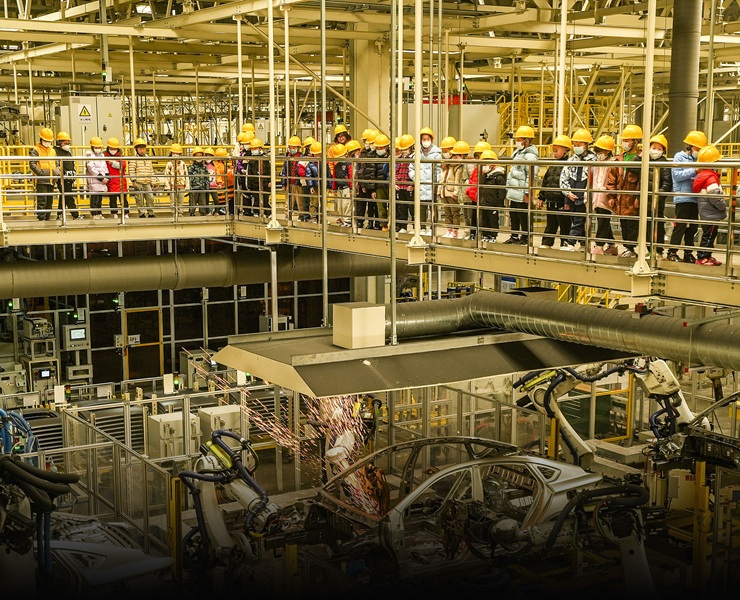Young Chinese opt for ‘industrial tourism’
From car factories to textile workshops, factory tours are selling out in the People's Republic. Itineraries include real attractions designed specifically to showcase industries not only as places of work, but above all as symbols of the country’s achievements.
Milan (AsiaNews/Agencies) – A new form of leisure activity is unexpectedly gaining ground in China: "industrial tourism" (gongchang you).
From car plants and coffee plantations to textile factories and soft drink bottling lines, tours of Chinese factories are selling out, attracting especially young people.
On the first day, the Xiaomi car factory in Beijing opened to the public in January, more than 4,600 people booked for just 20 available spots.
Tickets to visit the Unitree robotics company were resold for up to 3,000 yuan (US$ 420), such was the demand.
“This summer, we've seen a huge number of daily visitors. Tickets typically sold out two or three days in advance. July and August saw record numbers of visitors and revenue,” said Sun Ji, the director of the Qingdao Beer Museum, commenting on the new trend.
Industrial tourism is nothing new. Since the Citroën workshops opened to the public in the 1950s, European companies continue to welcome millions of visitors each year.
For China, however, this is still a niche sector, currently accounting for only 5 per cent of total tourism revenue, compared to 10-15 per cent in other developed economies. Despite this, its enormous potential is already evident.
But what drives young Chinese to choose factories over traditional weekend destinations like shopping malls or theme parks?
As the China Daily reports, for China's Gen Z, factories are not just places of work, but symbols of national achievement and modern ingenuity. Visiting a factory is simultaneously an educational activity, a cultural performance, and a statement of identity.
In other words, factory tours reflect young Chinese people's desire to understand their place in an ever-changing society and to reclaim a sense of belonging to the country's industrial history, a source of collective pride.
The success of factory tours not only highlights a rebranding of Chinese industry, from "Made in China" to "Experienced in China," but also speaks to the evolution of Chinese tourism towards more diverse and personalised forms of entertainment, favouring experiential activities.
With its conveyor belts, robotic arms, and automated assembly lines, the factory feels like something like Disneyland, to be explored through interactive exhibits, workshops, and themed tours.
It is also a place where people can satisfy their curiosity about how some of the products they consume or use in their daily lives are made and the philosophy behind them.
Many factories and farms have even organised workshops to entertain children, making them a favourite leisure destination for many Chinese families.
Liu Haoxuan, director of a ranch in Zengcheng District, eastern Zhejiang Province, said that 300 more visitors were recorded in July and August this year, compared to approximately 4,200 in 2024, most of whom were aged 3-12.
This combination of entertainment and education appears to be the formula that has made industrial tourism popular in China, as evidenced by the boom seen last summer.
The country currently boasts over a thousand such attractions, including multinational companies and local businesses.
Staff at Yuexiu Fengxing, a dairy farm in Guangzhou, southern Guangdong Province, reported that they welcomed an average of more than 2,000 visitors per month this summer, 10 per cent more than the same period last year. Weekend reservations were always fully booked weeks in advance.
Although China's industrial tourism sector is experiencing strong growth, many challenges remain.
Zhang Xiaofeng, director of the Zhejiang Tourism Science Research Institute, points to the inefficiency of factory tour services, which he believes should be further improved and expanded.
“Many factories are located in suburban areas,” Zhang told China Radio International, “with poor transportation and inadequate nearby restaurants, accommodations, and other support facilities, resulting in increased travel costs and inconvenience for tourists.
“Furthermore, some factories lack suitable internal spaces for guided tours, thus hindering the visitor experience.
Another critical issue concerns the capacity of Chinese companies to accommodate visitors, as bookings far exceed the number of daily admissions available.
According to Zhang, these problems can be easily resolved by strengthening cooperation with tourism platforms and expanding tour booking channels.
Local governments should also establish dedicated bus routes to transport visitors to interested companies. Only by doing so can industrial tourism evolve from a niche curiosity to a pillar of the country's cultural tourism industry.
12/02/2016 15:14
11/02/2025 17:34







.png)










